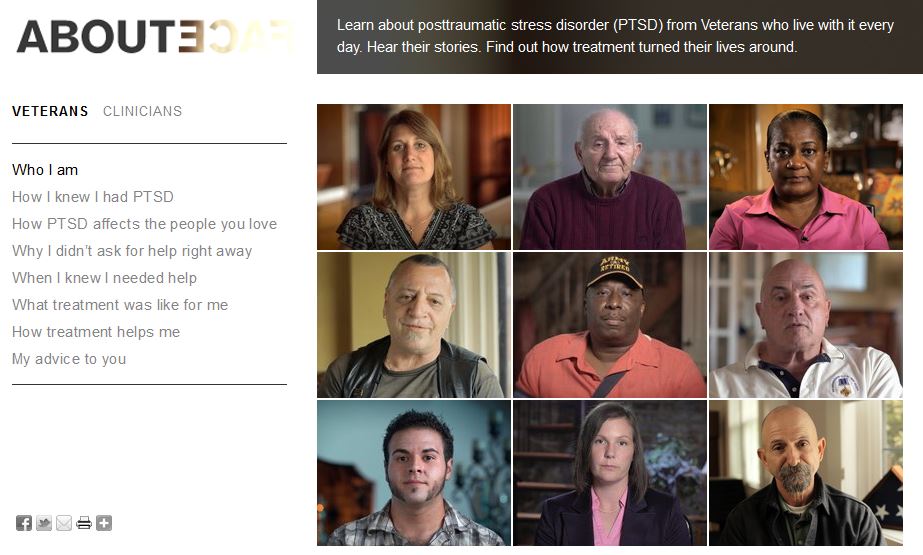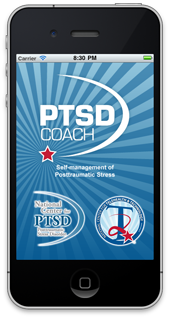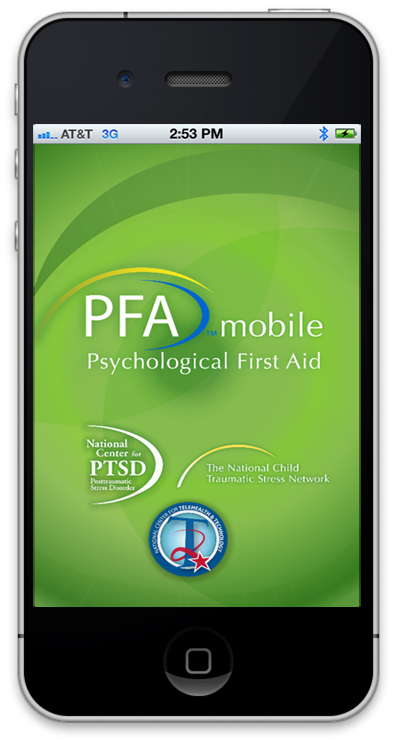 In May we focus on mental health awareness and on the right time to “Mind Your Health.” As we approach National PTSD Awareness Month in June, in this post we encourage Veterans to make the choice to use VA’s post-traumatic stress disorder resources, as needed, so they are able to recognize the symptoms and seek help.
In May we focus on mental health awareness and on the right time to “Mind Your Health.” As we approach National PTSD Awareness Month in June, in this post we encourage Veterans to make the choice to use VA’s post-traumatic stress disorder resources, as needed, so they are able to recognize the symptoms and seek help.
Treatment works, and there is hope for recovery for the Veterans who need mental health care. Help is here in many ways, shapes and sizes – with current technology, help can be found more and more in mobile apps and Web resources. Consider these readily-available apps and online options to help in learning about and coping with PTSD-related symptoms.

You’ll find information about other mobile apps that support the provision of evidence-based care here, including Prolonged Exposure (PE) Coach for PTSD (released 2012), Cognitive Behavioral Therapy for Insomnia (CBT-i) Coach (released 2013), and Stay Quit Coach for smoking cessation (released 2013) by VA and DoD.
Veterans can access care at AboutFace on the National Center for PTSD’s website. The center, operated by VA, provides this online video gallery dedicated to Veterans talking about how PTSD treatment turned their lives around. AboutFace was added in 2012.
The center also guides a national PTSD Mentoring Program, which works with every specialty PTSD program across the country to improve care. The center has provided training to more than 5,200 VA mental health staff in Prolonged Exposure and/or Cognitive Processing Therapy, the most effective known therapies for PTSD. Each June during PTSD Awareness Month, the center runs a national campaign to raise awareness about PTSD and its effective treatment.
The PTSD center’s consultation program was established in 2011 to reach any VA provider who treats Veterans with PTSD, including those in VA PTSD specialty care, those in other areas of mental health, primary care providers, and case managers. The program helps with questions about assessment and treatment services for Veterans with PTSD. By the close of FY 2013, there were more than 650 consultations completed – more than 550 for PTSD, and more than 75 for Suicide Risk Management, a feature added this year to the Consultation Service.
 VA and DoD also collaborated with the National Child Traumatic Stress Network to develop and disseminate a mobile app for disaster responders called PFA Mobile. The app, based on psychological first aid, was downloaded 6,877 times since its release in August 2012. It has additionally been localized into Japanese.
VA and DoD also collaborated with the National Child Traumatic Stress Network to develop and disseminate a mobile app for disaster responders called PFA Mobile. The app, based on psychological first aid, was downloaded 6,877 times since its release in August 2012. It has additionally been localized into Japanese.
Additional apps are in development to support Veterans, Servicemembers, health care providers, and the families and communities affected by military service.
Aimed at reducing the stigma associated with seeking mental health care, the Web-based campaign Make the Connection appeared in November 2011, and continues to inform Veterans, their families, friends and members of their communities about VA resources.
Launched by VA in 2012, the award-winning Start Moving Forward is an interactive Web-based, educational life-coaching program based on the principles of problem-solving therapy. It allows for anonymous, self-paced, 24-hour-a-day access that can be used independently or in conjunction with mental health treatment.
VA then launched the free online course Parenting for Servicemembers & Veterans in 2013. Developed jointly with DoD, it provides military and Veteran parents with information and strategies to improve their parenting skills.
 For family members concerned about a Veteran, VA has expanded the Coaching Into Care line nationally, after a successful pilot in two VA regions. The service helps family members and friends assist a Veteran in seeking care. Callers receive information about VA services and coaching on talking about treatment needs with the Veterans in their lives. Since the inception of the service in January 2010 through June 2013, Coaching Into Care has logged 8,460 total initial and follow-up calls. Callers are 81 percent female, and most are spouses or family members.
For family members concerned about a Veteran, VA has expanded the Coaching Into Care line nationally, after a successful pilot in two VA regions. The service helps family members and friends assist a Veteran in seeking care. Callers receive information about VA services and coaching on talking about treatment needs with the Veterans in their lives. Since the inception of the service in January 2010 through June 2013, Coaching Into Care has logged 8,460 total initial and follow-up calls. Callers are 81 percent female, and most are spouses or family members.
V
- Veterans Employment Toolkit, a resource that supports Veterans seeking work and also helps employers support their employees who are Veterans or members of the Reserve or National Guard.
- VA Campus Toolkit, a place where faculty, staff, and administrators can find resources to support student Veterans and learn about their strengths, skills and needs.
- Community Provider Toolkit, which provides information about VA services and resources, understanding military culture and experience, and tools for working with a variety of mental health conditions.
Overall, VA is one of the largest integrated mental health systems in the United States that provides specialized treatment for PTSD. To date, more than 530,000 Veterans (more than 140,000 from Operation Enduring Freedom/Operation Iraqi Freedom/Operation New Dawn (OEF/OIF/OND)) received treatment for PTSD in VA medical centers and clinics, up from more than 500,000 Veterans (of which 100,000 are from OEF/OIF/OND) in 2011.
For those of us who, despite the new apps and their easy-to-use nature, would prefer to make a phone call, here are some options:
Call 802-296-6300 for PTSD information voicemail.
If you are in crisis, please call 911, go to your nearest emergency room, or call the Veterans Crisis Line available 24/7 at 1-800-273-8255 (Spanish/Español 1-888-628-9454). Veterans, press “1” after you call.
You can also chat live online with a crisis counselor 24/7 by visiting the Veterans Crisis Line website.
Topics in this story
More Stories
Summer Sports Clinic is a rehabilitative and educational sporting event for eligible Veterans with a range of disabilities.
Report examines the input of over 7,000 women Veterans: They are happier with VA health care than ever before.
Veterans and caregivers, you can help shape the future eligibility requirements for the VA Caregiver Support program.






